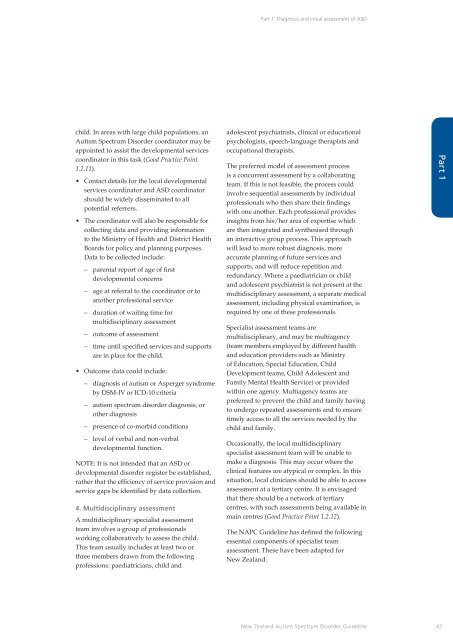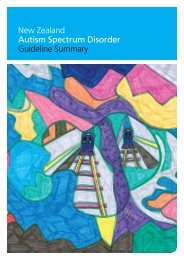New Zealand Autism Spectrum Disorder Guideline - Ministry of Health
New Zealand Autism Spectrum Disorder Guideline - Ministry of Health
New Zealand Autism Spectrum Disorder Guideline - Ministry of Health
Create successful ePaper yourself
Turn your PDF publications into a flip-book with our unique Google optimized e-Paper software.
Part 1: Diagnosis and initial assessment <strong>of</strong> ASD<br />
child. In areas with large child populations, an<br />
<strong>Autism</strong> <strong>Spectrum</strong> <strong>Disorder</strong> coordinator may be<br />
appointed to assist the developmental services<br />
coordinator in this task (Good Practice Point<br />
1.2.11).<br />
• Contact details for the local developmental<br />
services coordinator and ASD coordinator<br />
should be widely disseminated to all<br />
potential referrers.<br />
• The coordinator will also be responsible for<br />
collecting data and providing information<br />
to the <strong>Ministry</strong> <strong>of</strong> <strong>Health</strong> and District <strong>Health</strong><br />
Boards for policy and planning purposes.<br />
Data to be collected include:<br />
– parental report <strong>of</strong> age <strong>of</strong> first<br />
developmental concerns<br />
– age at referral to the coordinator or to<br />
another pr<strong>of</strong>essional service<br />
– duration <strong>of</strong> waiting time for<br />
multidisciplinary assessment<br />
– outcome <strong>of</strong> assessment<br />
– time until specified services and supports<br />
are in place for the child.<br />
• Outcome data could include:<br />
– diagnosis <strong>of</strong> autism or Asperger syndrome<br />
by DSM-IV or ICD-10 criteria<br />
– autism spectrum disorder diagnosis, or<br />
other diagnosis<br />
– presence <strong>of</strong> co-morbid conditions<br />
– level <strong>of</strong> verbal and non-verbal<br />
developmental function.<br />
NOTE: It is not intended that an ASD or<br />
developmental disorder register be established,<br />
rather that the efficiency <strong>of</strong> service provision and<br />
service gaps be identified by data collection.<br />
4. Multidisciplinary assessment<br />
A multidisciplinary specialist assessment<br />
team involves a group <strong>of</strong> pr<strong>of</strong>essionals<br />
working collaboratively to assess the child.<br />
This team usually includes at least two or<br />
three members drawn from the following<br />
pr<strong>of</strong>essions: paediatricians, child and<br />
adolescent psychiatrists, clinical or educational<br />
psychologists, speech-language therapists and<br />
occupational therapists.<br />
The preferred model <strong>of</strong> assessment process<br />
is a concurrent assessment by a collaborating<br />
team. If this is not feasible, the process could<br />
involve sequential assessments by individual<br />
pr<strong>of</strong>essionals who then share their findings<br />
with one another. Each pr<strong>of</strong>essional provides<br />
insights from his/her area <strong>of</strong> expertise which<br />
are then integrated and synthesised through<br />
an interactive group process. This approach<br />
will lead to more robust diagnosis, more<br />
accurate planning <strong>of</strong> future services and<br />
supports, and will reduce repetition and<br />
redundancy. Where a paediatrician or child<br />
and adolescent psychiatrist is not present at the<br />
multidisciplinary assessment, a separate medical<br />
assessment, including physical examination, is<br />
required by one <strong>of</strong> these pr<strong>of</strong>essionals.<br />
Specialist assessment teams are<br />
multidisciplinary, and may be multiagency<br />
(team members employed by different health<br />
and education providers such as <strong>Ministry</strong><br />
<strong>of</strong> Education, Special Education, Child<br />
Development teams, Child Adolescent and<br />
Family Mental <strong>Health</strong> Service) or provided<br />
within one agency. Multiagency teams are<br />
preferred to prevent the child and family having<br />
to undergo repeated assessments and to ensure<br />
timely access to all the services needed by the<br />
child and family.<br />
Occasionally, the local multidisciplinary<br />
specialist assessment team will be unable to<br />
make a diagnosis. This may occur where the<br />
clinical features are atypical or complex. In this<br />
situation, local clinicians should be able to access<br />
assessment at a tertiary centre. It is envisaged<br />
that there should be a network <strong>of</strong> tertiary<br />
centres, with such assessments being available in<br />
main centres (Good Practice Point 1.2.12).<br />
The NAPC <strong>Guideline</strong> has defined the following<br />
essential components <strong>of</strong> specialist team<br />
assessment. These have been adapted for<br />
<strong>New</strong> <strong>Zealand</strong>.<br />
Part 1<br />
<strong>New</strong> <strong>Zealand</strong> <strong>Autism</strong> <strong>Spectrum</strong> <strong>Disorder</strong> <strong>Guideline</strong> 47











